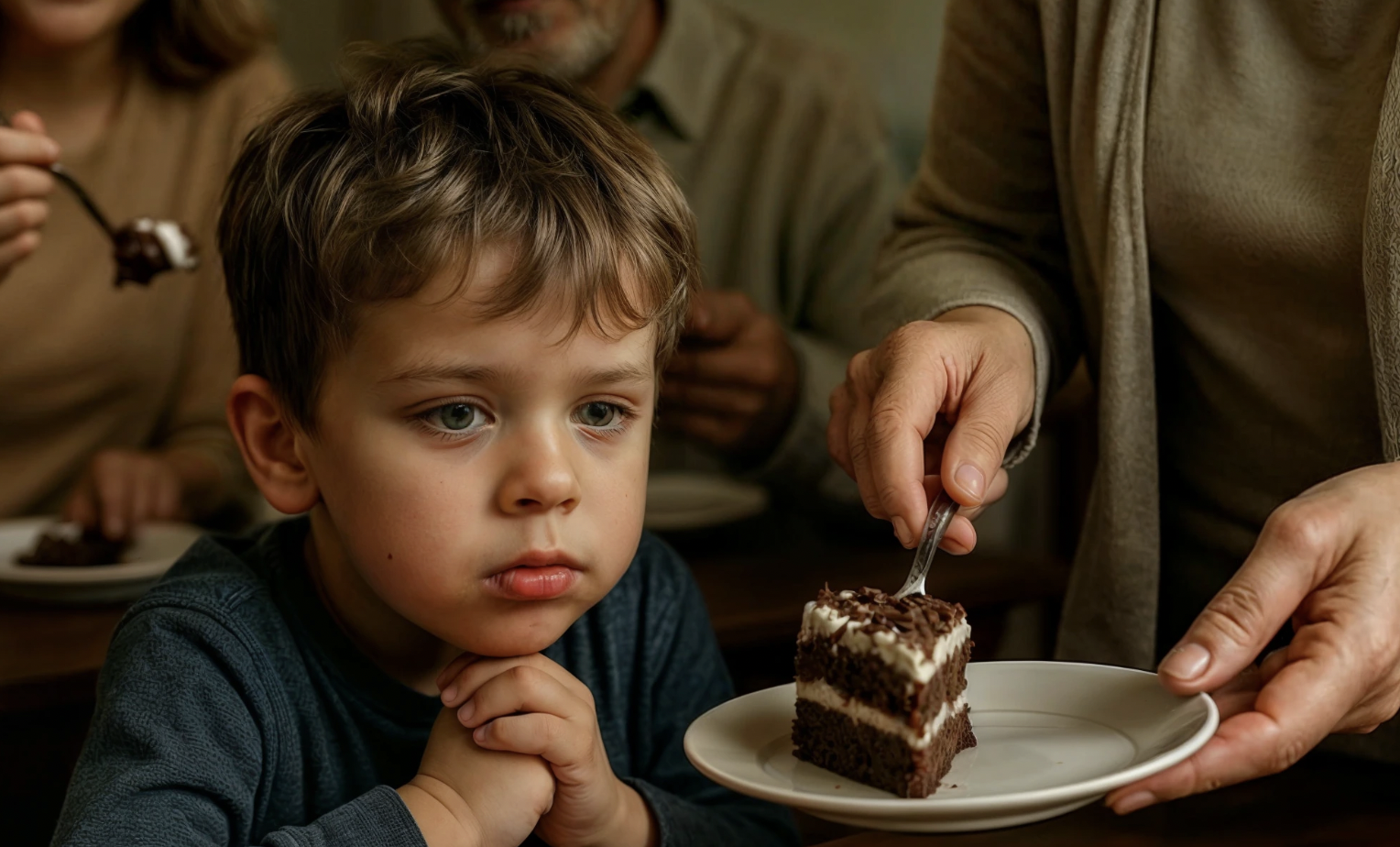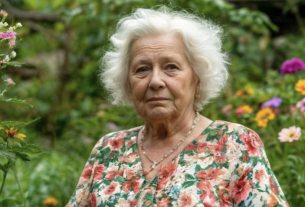Only for Mashenka
“Hey, what are you looking at?” Grandma Nadezhda Petrovna finally notices Lisa, as if she had materialized at the table by accident.
Lisa remains silent. She simply watches as Mashenka squints with pleasure while licking a pink drop of ice cream from a waffle cup. The second one is held in her hand. A spare one, as grandma said.
“Mashenka can have some,” she adds, tucking a strand from her favorite granddaughter’s forehead. “She’s had a tough day today, coming off rehearsal, tired. It’s a present for her.”
Lisa swallows hard. She craves ice cream very much. And she also wishes to be noticed too. To be asked, to simply not be forgotten.
Grandma gets up, gathers the wrappers, and tosses them over her shoulder:
“Lisa, you can’t have any. Your mom doesn’t allow sweets.”
Lisa answers nothing. She doesn’t cry. She just stares at the tiled floor, pretending she doesn’t care.
Not for the first time.
Last time it was candies. Before that – a doll. Then – a trip to the circus, to which only Mashenka was invited. Lisa was always “later,” “another time,” “and you don’t need this.”
But she remembers everything. Exactly.
Prejudice from the Start
Masha ate ice cream; Lisa watched. But it did not all begin with ice cream.
Once, Olesya stepped into that very kitchen for the first time—with porcelain little vases on the windowsill holding withered flowers, with a spicy aroma of cinnamon mixed with something medicinal. Nadezhda Petrovna, her future mother-in-law, took a pie out of the oven, set it on the table, wiped her hands on her apron and, without turning around, said:
“Well, come in. Take off your shoes; this isn’t the street.”
No smile, no “nice to meet you” or “tell me about yourself.” Instead, it was as if she already knew: this girl wasn’t the one.
At that time, Olesya had just started dating Lyosha. She had little confidence, but plenty of hope. She wanted to be liked, to find common ground, to become part of the family. She had brought a small bouquet as a gift, bought with her last money and neatly wrapped in kraft paper.
“Flowers? Thank you, of course… But I’m allergic to them.”
Her mother-in-law took the bouquet as if it were a rag and carelessly placed it in a jar next to the microwave.
Olesya exhaled and forced a smile.
“I didn’t know, I’m sorry.”
“Never mind, now you know,” Nadezhda Petrovna curtly nodded.
The conversation didn’t click. Lyosha tried to joke, to pour tea, praised the pie. Olesya tried to be polite, listened, agreed. But at some point Nadezhda Petrovna interrupted everything with a single sentence:
“So, Olesya, what do you do?”
“I work in a store, in the accounting department,” she answered. “Handling invoices, bills…”
“Oh, I see. Well, that profession isn’t for everyone,” said her mother-in-law with that expression that can be described as “without judgment, but with conclusions.”
Olesya felt a tightening in her chest. Not so much hurt as if you’ve already been placed somewhere. On a shelf, far from the front.
After that, there were meetings at the holidays. Family feasts, conversation with glances, obligatory questions. Everything was proper. But without soul. Ira – Lyosha’s sister – was like an extension of the mother: confident, quick, taciturn. Together with Nadezhda Petrovna, they easily merged into a tandem in which Olesya found no place.
In their conversations she was always “the third.” Merely a listener. Or an observer. Never an active participant.
Then there was the wedding. A small, modest one. With no pretensions.
“We threw a wedding for Ira with a reception, you know. But times are different now. We can’t help. Well, you’re adults yourselves,” Nadezhda Petrovna said, looking past them.
Olesya was hurt then. Seriously – not because of money. It just became completely clear: no one was waiting for her here. At best, she was tolerated.
With the birth of the children, everything became even clearer. But by then she no longer dreamt of “being liked.” She just lived. Learned not to pay attention. To swallow her feelings. Not to take it to heart.
Lyosha often said:
“Mom is just strict. Deep down, she’s kind.”
But Olesya knew: there would never be warmth in their relationship. It was already allocated by the mother-in-law. To others.
By the Privilege of the Chosen
Masha was born first—a daughter of Ira, Lyosha’s sister. Eight months later, Lisa appeared. Nearly the same age. Almost like sisters, as the photos suggested. But not in real life.
Masha grew up in her grandmother’s love. She got everything: toys, developmental gadgets, activity classes, fruits cut into pieces, sweets. Nadezhda Petrovna chased her around playgrounds, called the kindergarten teacher, discussed nutrition and the room’s temperature.
Lisa, meanwhile… just existed. Simply existed. Calm, without demanding special attention. And the mother-in-law took advantage of that.
“You know, Mashenka has a sensitive stomach. I’ll make a special dish for her. And Lisa – she’ll eat what’s prepared,” Nadezhda Petrovna once said while taking a pot off the stove.
Olesya no longer found it surprising. When the whole family visited, Lisa almost always ended up with an old toy forgotten by one of the neighbor’s kids. And Masha got something new, still in its package. A doll with little eyelashes, a modeling clay set, the latest magazine with stickers. Sometimes right at Lisa’s expense.
“Don’t be jealous,” Grandma would say as if in passing. “Mashenka’s birthday is coming soon. And for you… we’ll buy it later.”
Later never came. Or if it did, it came without a package filled with surprises.
One day they all entered together—Olesya, Lyosha, Lisa, and Ira with Masha. In their hands were shopping bags, on their faces a light fatigue—due to the journey, heat, traffic. In the corridor, quick footsteps and a ringing voice were heard:
“Mashenka, my little bird!” she exclaimed and opened her arms wide, throwing a towel right onto the table. “And where were you all this time, sunshine?”
Olesya stood aside, holding Lisa’s hand. The girl glanced at her grandmother and bit her lip.
A torrent of attention descended upon Masha: questions, head pats, admiring sighs.
“How much you’ve grown!”
“How big you are now, I hardly recognize you!”
“You’re all like your mom!”
Words rained down like confetti. Lisa watched this, and remained silent. No one noticed her.
“Hi, Grandma,” she said quietly.
“Hi-hi,” Grandma replied without turning around. “Masha, come on in quickly; I’m about to pour your favorite fruit drink.”
Olesya tried to talk to Lyosha. More than once. First gently:
“Have you noticed that Mom always gives everything to Masha, while Lisa gets what she can?”
“Come on,” he frowned. “You’re just being finicky. Mom has always been closer to Ira. It’s not from malice, it’s… just habit.”
“And Lisa? Isn’t she a granddaughter too?”
“Of course she is. It’s just… Ira asks for help more often. That’s all.”
Olesya sighed. Lyosha seemed either genuinely unwilling or unable to notice. And he increasingly fell silent. Lisa grew up. And she began to understand more than they thought.
One day, on the way back from Grandma’s, she asked from under her hood:
“Mom, does Grandma love me?”
Olesya nearly crashed into the curb.
“Of course she loves you. It’s just… grandmothers show it in different ways.”
Lisa was silent, staring out the window.
The next day she drew a picture: she and her mom standing apart, while Masha and Grandma held hands. Above them—a rainbow. Over Olesya and Lisa—a little cloud.
And it was clear: she saw everything. She felt everything.
The Day with the Strawberries
Originally, the plan was for the beach.
The day turned out to be hot, nearly thirty degrees. The sun had been beating against the windows from the morning as if to remind: summer isn’t forever, make use of it. Lyosha suggested going to the lake, taking Lisa to swim and lie on the sand. Olesya gathered everything in fifteen minutes—swimsuit, towel, sunscreen, water, a snack. The girl twirled in the corridor wearing her panama hat and was already tugging at her hand: “Ma’am, let’s go already!”
But at the last moment, the phone rang.
“Mom, seriously? Really urgent?” Lyosha turned to the window and spoke in a restrained tone, though his voice rose slightly. “Alright, we’ll swing by.”
“Is it the country house?”
“Yes. They need something. They said something in the fuse box burned out. We’ll just do a quick stop.”
They reached the country house after half an hour. The heat was dense and sticky. Breathing in the car was difficult, and Olesya said:
“Let’s go with Lisa to the gazebo, at least there is some shade. You go sort out the fuse box.”
The gazebo was located in the back section, semi-open, with plastic chairs and a table covered with green polka-dotted tarpaulin. On the table—a bowl of strawberries. The berries were large, fresh, and smelled so enticing that one’s stomach began to grumble.
Lisa approached, peered into the bowl.
“May I have one?”
“Of course, take a couple,” Olesya smiled. “Just don’t get your dress dirty, or I won’t be able to remove the stains later.”
The girl sat on a stool, carefully took one berry, then another. She ate five—leisurely, savoring each bite.
At that moment, Nadezhda Petrovna appeared.
“What is this?!” her voice was sharp, like the crack of breaking glass. “Who gave permission?”
Olesya turned, not immediately understanding what the fuss was about.
“Lisa ate a couple of berries. But here there’s a whole bowl…”
“These berries aren’t for you! I gathered them for Masha! I spent the morning in the garden in forty-degree heat, and now they’re being gobbled up!”
Lisa said nothing. Her cheeks flushed red. She didn’t understand what she had done wrong—the berries were simply there, on the table.
Olesya stood up.
“We’ll leave, if you feel sorry for us.”
“Not sorry. Disappointed. You should have asked.”
“Isn’t it amazing how you can twist everything around,” Olesya said quietly, taking her daughter’s hand. “Thank you for the hospitality.”
They walked away toward the car. Lisa didn’t cry. She merely squeezed her mother’s hand—firmly, like an adult.
Goodbye, Raspberry Cake
“I don’t want to go there, Lyosh.”
“I really, honestly don’t want to,” Olesya said on the kitchen, crossing her arms. “It’ll be another circus: Masha on a pedestal, Lisa pushed into the corner. I’ve had enough of the country house.”
“Olesya…” he sighed. “It’s a birthday party. Ira’s. Well, Masha’s. We can’t just not go. They’re family.”
“Then let the family celebrate.”
He stepped closer, embraced her.
“Just for an hour. We’ll have some cake, congratulate them, and then – home. I promise.”
In Ira’s apartment, as always, there were many guests. The smell of food, children’s shrieks, balloons, wrapping paper—everything as it should be. Masha ran around in a new, puffy skirt adorned with glitter, waving a plush unicorn and showing off all her “new makeup.” Her blush, as pink as marmalade.
Lisa stood next to her mom, a little apart, clutching a book which she had chosen herself as a present for Masha. A new book, hardbound, with gold embossing. Masha glanced at her, muttered “thank you” under her breath and immediately turned her attention to the next bag.
“Everyone, to the table!” Ira called out. “The cake is coming!”
The cake was indeed beautiful: tall, two-tiered, decorated with strawberries, raspberries, and figurines on top. Masha shone as if under a spotlight. Everyone clapped, sang “happy birthday,” then began cutting it.
Nadezhda Petrovna took a knife and personally divided the portions. She set aside for Masha a piece with a figurine.
“This is for you, darling. The largest one, with a raspberry, just the way you like it.”
Then—for Ira. Then—for herself. Then—for the other children, then—for distant relatives. And then—for no one else.
Lisa sat, propping her cheek with her hand. The room was noisy, hot. She watched as other kids ate: crumbs on their cheeks, cream on their fingers. Next to her was an empty plate.
“And what about Lisa?” Olesya asked calmly, yet softly.
“Huh?” her mother-in-law turned, already holding the nearly finished piece. “And for Lisa? Well… that’s all. If anything – there are waffles in the kitchen, let her have those.”
Lyosha heard this. Clearly. Without any hesitation.
He stood up. He took the plate holding the last piece of cake from his mother’s hands and placed it in front of Lisa.
“Eat up, Lisa, sweetheart,” Lyosha said tenderly, patting his daughter on the head.
For a moment, silence fell over the table. Someone coughed. Someone stared at their phone. Olesya looked at her husband and said nothing.
Lisa ate silently. Slowly. But for the first time – with a piece adorned with a raspberry on top.
When they returned home, it was already dark. Lisa sleepily rubbed her eyes and nearly dozed off on her feet. Olesya helped her remove her jacket and sent her to the room where her soft fox plush, with a torn ear, was already waiting on the bed.
The kitchen was cool and quiet. Lyosha silently hung his jacket on the back of a chair, sat down, and leaned back heavily. He ran his hand across his face, as if wanting to erase the entire day.
“Olesya…” his voice was quieter than usual. “You were right.”
She sat opposite him. No surprise, no triumph—only a look in which illusions had long since faded.
“I know,” she said simply.
He fell silent for a moment. In the kitchen, cheap clocks ticked. In another room, the bed creaked—Lisa was tossing in her sleep.
“I don’t want to take her there anymore. Under any pretext. No more ‘but it’s Grandma’ or ‘it’s a celebration.’ That’s enough.”
“Me too,” Olesya nodded. “For a long time now.”
He looked out the window. Outside, the taillights flashed, and then the night engulfed everything again.
“You know what’s the most terrible?” he finally said. “She didn’t even cry. She just sat there. Just watched as others got… and she got nothing. As if she was used to it. As if she had known all along.”
His voice trembled, but he quickly composed himself.
Olesya lowered her eyes.
“They know how to be silent. But that doesn’t mean they don’t feel—” she said. “They just don’t know yet that things can be different.”
He nodded slowly, each movement heavy.
And in that quiet kitchen, under the dim light of the ceiling lamp, something happened that neither quarrels, admonishments, nor persuasion could achieve. There came understanding.
The Grandmother’s Sudden Revelation
The next evening, Nadezhda Petrovna called. The call came at 19:48—a time when Lisa usually watched cartoons after her shower. The phone vibrated on the windowsill. Olesya stood at the sink, washing dishes, her gaze drifting out the window at the twinkling lights of the neighboring houses. Meanwhile, Lyosha was scrolling through news on the sofa, but when the screen lit up with “Mom,” he immediately answered.
“Hello?”
“Lyosha, hi. Are you busy?”
Her voice was different from usual. Not harsh, but cautious. With unspoken meaning, masked as concern.
“No, speak.”
“I was thinking… we didn’t end things on a good note. I wanted to talk about yesterday. About the birthday. About Lisa.”
He was silent.
“I later realized that maybe I missed something. It was just all so hectic, many guests, you saw. I really thought she didn’t want the cake. She sat there so quietly—I didn’t understand right away…”
“You often don’t understand her,” he said calmly, without anger.
“Oh, don’t say that. I wasn’t coming from a place of malice. Masha, she’s like a daughter to me. I’ve babysat her since she was little. And Lisa… you hardly ever come; I just don’t know how to reach her. And so it turns out. I didn’t want to hurt anyone. Especially not Lisa. Could I… speak with her?”
Lyosha glanced at his daughter. She sat on the floor, watching cartoons.
“She doesn’t want to,” he said quietly.
“Then please ask…”
“I know. She said it herself. When she heard the phone ring, she said, ‘If it’s Grandma, I don’t want to talk to her.’”
There was silence on the other end.
“I understand,” she finally said, though her voice trembled. “I just… did everything the way I knew. Maybe I was wrong. I didn’t think you’d take it so personally.”
“Mom. Let’s finish this conversation. Now’s not the time. We bear no grudge. But we won’t be explaining further why you can’t do that with us.”
He did not wait for an answer and hung up.
The Point of No Return
Two weeks passed. During that time Nadezhda Petrovna did not call. Neither to Lyosha nor to Olesya. She didn’t write. Did not remind them of her presence. Perhaps she expected them to reach out first. Perhaps she was hurt. But, as Olesya once said: “When they don’t call, that too is a response.”
Life went on. Quietly, without needless conversation. Somehow it became easier to breathe.
Lisa began bringing home drawings from kindergarten, in which Grandma no longer appeared. Now there were cats, a fox with a long tail, or a little house with a mom, dad, and a girl on a swing. Sometimes – three figures under an umbrella, sometimes – under a rainbow.
Olesya noticed: her daughter no longer asked about Grandma. And no longer expected anything. Neither a toy, nor a kind word. It was as if she had let go. Simply, but very sincerely, like a child.



